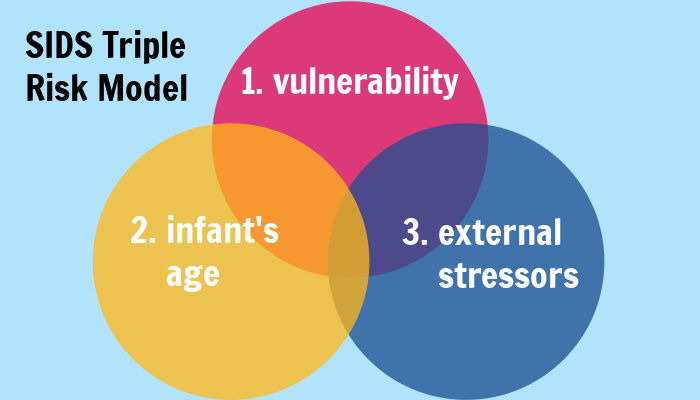SIDS Breakthrough: New Research Indicates Possible Cause for Sudden Infant Death Syndrome

Researchers at the SIDS and Sleep Apnoea Research Group at The Children’s Hospital at Westmead Australia released findings in the June 2022 edition of The Lancet’s eBioMedicine from a long-range study looking at possible markers for SIDS in newborn babies.
My research started 29 years ago with the death of my precious son, Damien. Long and challenging work, but now we know that SIDS babies have low levels of the enzyme BChE. First time ever we can work with babies while still alive and prevent SIDS. https://t.co/70miO5lfLA
— Carmel Harrington (@CarmelHarring18) May 9, 2022
Current research has shown that SIDS is most likely not caused by one thing, but rather presents as a “triple risk model” with three factors contributing to a baby’s risk level:
- A vulnerable infant
- A critical development period (ie first 6 months of life)
- An external stressor
While this model has been accepted by most medical experts, the biggest unanswered question has been what makes a baby vulnerable? Now we may know the answer.
The breakthrough discovered by the Australian team shows that babies who succumb to SIDS are much more likely to have low levels of Butyrylcholinesterase (BChE).
“The study found BChE levels were significantly lower in babies who subsequently died of SIDS compared to living controls and other infant deaths,” according to Sydney Children’s Hospital Network. “BChE plays a major role in the brain’s arousal pathway and researchers believe its deficiency likely indicates an arousal deficit, which reduces an infant’s ability to wake or respond to the external environment, causing vulnerability to SIDS.”
In other words, most 0-6-month-old infants faced with an external stressor (such as overheating or difficulty breathing) while sleeping would wake and cry for help and attention, but babies with low BChE may not be able to rouse themselves.
Dr. Carmel Harrington, the lead researcher in the study, points out just how important this new information really is. She says that we have always suspected that babies at high risk for SIDS must have difficulty responding to external dangers, “but up to now we didn’t know what was causing the lack of arousal. Now that we know that BChE is involved we can begin to change the outcome for these babies and make SIDS a thing of the past.”
Related Posts

Eye Conditions and Syndromes, Visual Impairment
Neuralink Announces Plans to Restore Sight to the Blind with Brain Chip
Elon Musk’s company Neuralink has announced plans to begin human trials of its new “Blindsight” brain chip by the end of 2025.

Health & Nutrition
Can Baby Skin Care Products Expire?
Is that forgotten tube of diaper rash cream still safe to use? Learn more about the expiration dates of popular skin care products for infants.

Health & Nutrition
Boosting Immunity in Kids: 3 Tips for a Healthy Winter
Parents can help boost their kids’ immunity during cold and flu season by maintaining healthy eating, sleeping, and exercising habits in the winter.